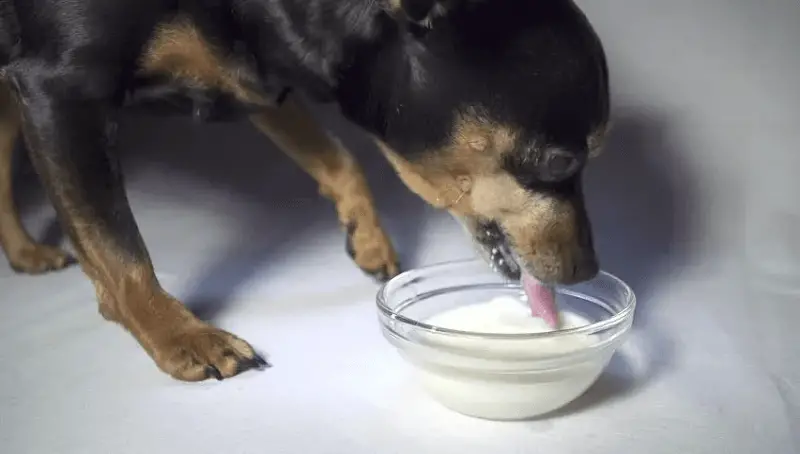
How Long Do Mini Lops Live For? Their Life Expectancy
April 29, 2022
Which Birds are Considered Mammals? – Mammals With Wings
May 1, 2022
This is the most common question dog owners ask when they want to make sure they are giving their dog a proper and healthy diet. This seems like a simple question, but the answer depends on both the pet and the type of milk you want it to consume.
You may be surprised to learn that milk can be bad for your dog. Of course, we’ve all seen a lot of pictures of them enjoying a bowl of milk. But the truth is that not all dogs digest milk as they should, being either allergic or lactose intolerant.
Cow milk offered as a treat is safe in small quantities. From time to time you can give it a few tablespoons of cow’s milk or goat’s milk, and can be a nice reward for your dog without having any side effects of overindulgence.
In this article, I will give you both the pros and cons of cow milk consumption. This will help you make an informed decision when you ask, “Can my dog drink milk?” or, “Can puppies drink milk?”.
Lactose and lactase
In order to be digested, lactose must be divided into two simple sugar formulas: glucose and galactose. When lactose decomposes, it allows glucose and galactose to be absorbed into the blood. So, if your dog produces enough lactase in the intestines (lactase is a necessary enzyme that helps break down lactose), chances are they will tolerate milk and milk-derived products. If its body does not produce enough lactase, then the ingested lactose will not break into the two compounds and cannot be digested and absorbed.
You might also like my articles on whether dogs can eat chestnuts, alfredo sauce, or Nutella.
When this happens, the dog is lactose intolerant. When the dog’s body cannot tolerate milk and milk products, it will show the following symptoms:
- bloating,
- gas,
- diarrhea,
- vomiting.
Lactose intolerance is the main reason why milk and many milk-derived products are on the list of foods that can be consumed but which may present a moderate risk.
Can a dog become lactose intolerant?
The answer is “Yes!” When they are young, they generally have the lactase enzyme in their body that helps them tolerate the lactose from breast milk. Once they are weaned, they will produce less lactase and this will be the time when many dogs will become lactose intolerant.
Can I give it milk when it is a puppy?
Yeah, but not all types of milk are good. Puppies usually feed on their mother’s milk, which is different from cow’s or goat’s milk. If you are raising a puppy who no longer has access to its mother’s milk, you need to consider a formula to replace the milk. Talk to your veterinarian to choose the right formula and schedule for your puppy!
Can puppies drink cow milk?
 Puppies that for various reasons have been without breast milk before the weaning age, which is usually between 6 and 8 weeks of life, may be fed with cow milk during this period. Be aware that powdered milk specially designed for them is the best option for them because it has a formula close to that of the mother’s breast milk. In special cases, they can also be fed with cow milk, but you should know that it has a low nutritional value that needs to be enriched.
Puppies that for various reasons have been without breast milk before the weaning age, which is usually between 6 and 8 weeks of life, may be fed with cow milk during this period. Be aware that powdered milk specially designed for them is the best option for them because it has a formula close to that of the mother’s breast milk. In special cases, they can also be fed with cow milk, but you should know that it has a low nutritional value that needs to be enriched.
Thus, in 200 milliliters of pasteurized cow milk, with a fat content of 3,5%, you need to add a tablespoon of sour cream, a teaspoon of honey, egg yolk, from an egg, and 15 drops of lemon juice, and mix all these ingredients at room temperature. It is a formula that can be administered in rare situations, as an alternative to powdered milk, which is a much healthier food for them.
Puppies have the lactase enzyme in their body, which helps them tolerate lactose, but the weaning will make their bodies produce less lactase, and this means that many dogs will become lactose intolerant.
Can pregnant dogs drink cow’s milk?
You should avoid feeding your pregnant dog cow milk as it can cause diarrhea. During their pregnancy, dogs must have a balanced diet, as dehydration may lead to miscarriage.
Is milk good for dogs?
If a dog that consumes milk does not show any of the above symptoms, then it can consume milk without problems. Milk is a very rich source of nutrients such as potassium, folic acid, and calcium, but also vitamins such as vitamin D and B12. But you need to know that your dog can also receive these nutrients from its food, whether dry or wet. Veterinarians say moderation is the key to milk administration.
There is another problem with cow milk you should consider when giving it to your dog.
I want to mention another very important thing about cow milk, but it has nothing to do with lactose; this is the fat content. As you may know, many categories of milk and dairy products contain a very high fat percentage, as in the case of cow milk. A very high amount of fat can also cause stomach aches and in many cases can lead to pancreatitis, a very serious condition that is often fatal. So, it’s good to be very careful about the fat content of cow milk that you want to give to your dog.
What happens when a dog gets pancreatitis?
Pancreatitis occurs in dogs whenever they receive too much fat in their diet. Even a single piece of meat that was too fat can make it sick. Your dog’s pancreas will overproduce enzymes that in turn cause pancreatitis.
Signs of this disorder include:
- Hunched walk
- Frequently vomiting
- Bloated stomach and pain
- Diarrhea
- Loss of appetite
- Dehydration
- Lethargy
- Fever
If you notice any of these symptoms in your dog, after a high-fat cow milk snack or other high-fat snacks, go to a veterinarian immediately!
So, to wrap things up; can dogs drink cow milk or not?
The answer to that question is simple… maybe. My advice is this: When you want to introduce a new food into your dog’s diet, it’s good to do it slowly, in moderation, and monitor it closely. In addition, it is very important to ask your veterinarian whenever you have any concerns about the foods in your dog’s diet. Your veterinarian is best able to give you a good and useful answer for your dog to have a healthy and happy life.
